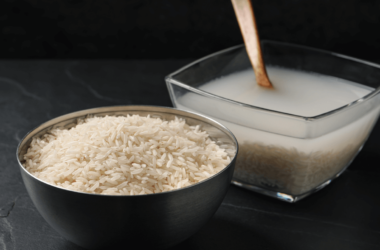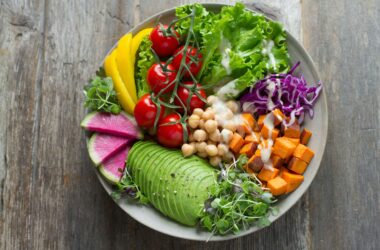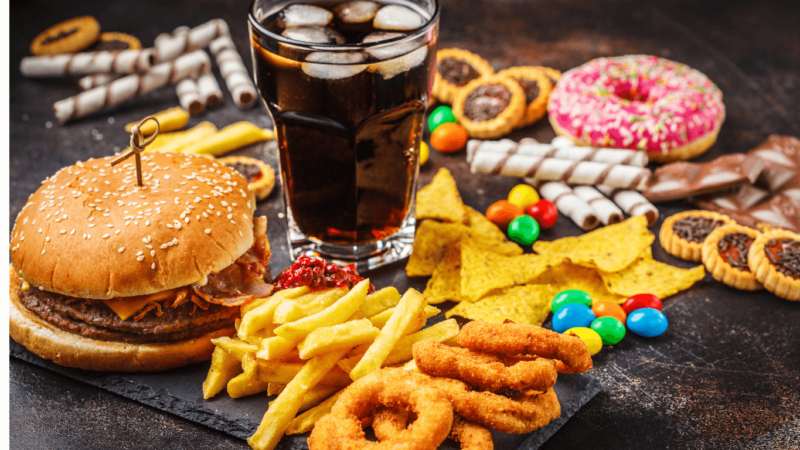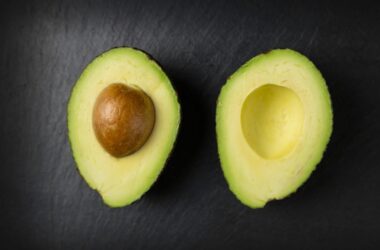Ever noticed how your skin takes on a different feel after the holiday indulgences?
Perhaps a chocolate binge or one too many cups of coffee left you facing unexpected breakouts?
Or maybe, skipping out on water for a while left your skin feeling dry and lackluster?
These experiences aren’t mere coincidences.
It’s because what we eat affects our skin.
That’s why we’re here with a blog about 10 foods secretly making you age faster!
Keep reading to find out what these foods are and get ready to make healthier choices for your skin.
Let’s make your skin happier, step by step!
10 Foods That are Secretly Aging You Faster
Here are ten specific foods that, when consumed in excess or in an unhealthy manner, may have negative impacts on aging:
1. Processed Foods
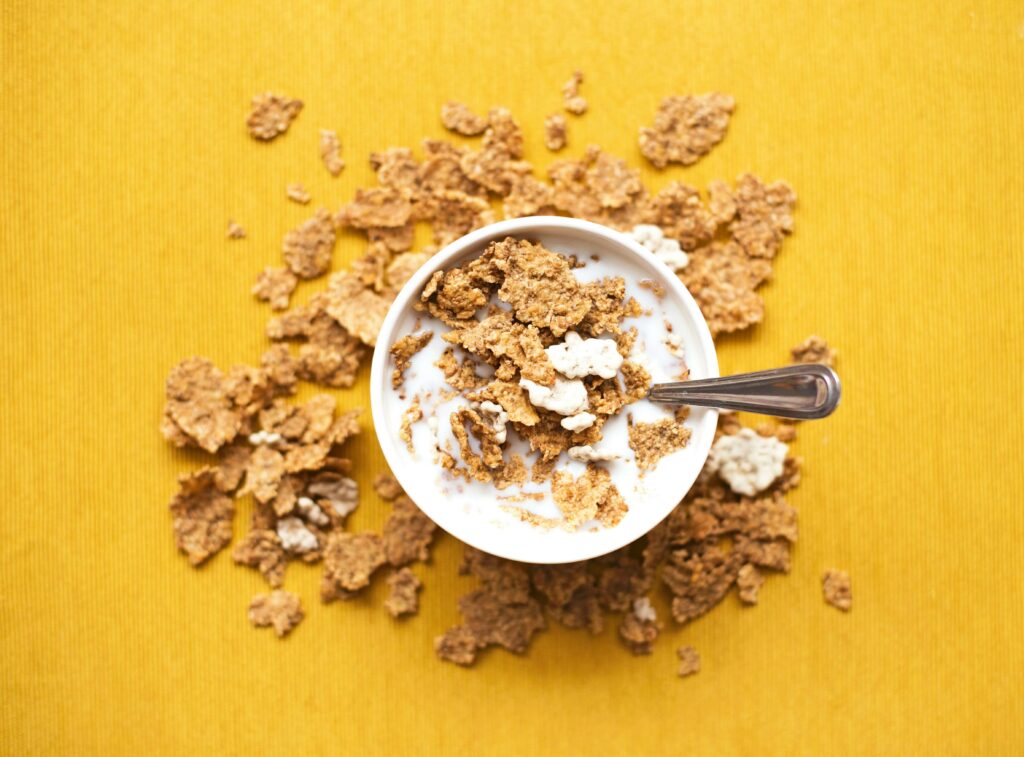
Processed foods are altered from their original form and often include additives and preservatives.
Examples include packaged snacks and frozen meals.
Why Processed Foods May Accelerate Aging
- High Sugars: Processed foods often contain refined sugars, promoting glycation and the formation of AGEs, linked to aging[1].
- Trans Fats and Unhealthy Fats: Found in many processed foods, trans fats and unhealthy fats contribute to inflammation and oxidative stress.
- Additives and Preservatives: These can lead to inflammation and allergic reactions, potentially accelerating aging.
- Nutrient Deficiency: Processed foods lack essential nutrients, fiber, and antioxidants, impacting overall health.
Healthy Alternatives
- Whole Foods: Choose fruits, vegetables, lean proteins, and whole grains for essential nutrients and antioxidants. Fruits, specially like citrus fruits boost skin health with vitamin C and antioxidants, promoting collagen, brightness, and protection against environmental damage.
- Cook at Home: Control ingredients and methods by cooking meals at home, reducing reliance on processed options.
- Snack Smart: Opt for whole food snacks like nuts, seeds, fruits, and vegetables.
- Read Labels: Choose processed foods with fewer additives, lower sugar, and minimal trans fats.
- Limit Fast Food: Fast food is often processed and high in unhealthy components; minimizing intake supports a healthier diet.
2. Sugary Beverages
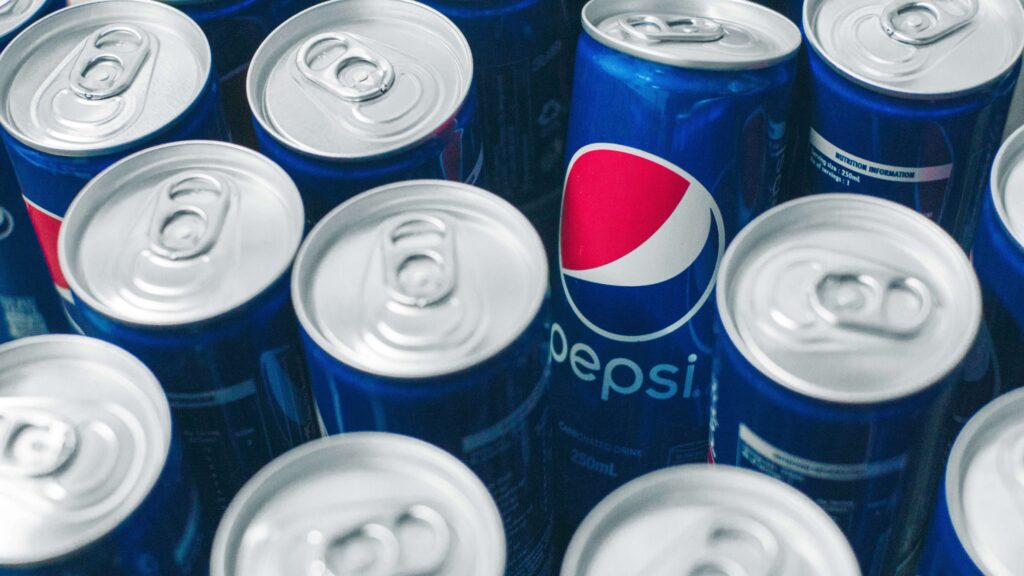
Sugary beverages encompass drinks with added sugars, such as sodas, fruit juices, energy drinks, and sweetened teas. These drinks contribute significantly to daily sugar intake.
Why Sugary Beverages May Accelerate Aging
- High Sugar Content: Sugary beverages are loaded with refined sugars, leading to spikes in blood sugar levels and promoting glycation, a process linked to accelerated aging[2].
- Inflammation: Excessive sugar intake, especially in liquid form, can contribute to chronic inflammation, a factor associated with various age-related diseases.
- Dehydration: Some sugary drinks can contribute to dehydration, negatively affecting skin health and potentially accelerating the aging process.
- Weight Gain: High-calorie sugary beverages, consumed regularly, can contribute to weight gain and obesity, both of which are linked to premature aging.
- Dental Issues: The high sugar content in these beverages can lead to dental problems, including cavities and gum disease, impacting overall health and potentially aging.
Healthy Alternatives
- Water: Opt for plain water as your primary beverage. It helps with hydration, supports overall health, and has no added sugars.
- Herbal Teas: Unsweetened herbal teas provide a flavorful and hydrating alternative to sugary drinks without the added sugars.
- Infused Water: Add natural flavors to water with slices of fruits, vegetables, or herbs for a refreshing and healthier alternative. Detoxifying drinks like lemon and ginger drink is full of nutrients and great for your skin health
- Sparkling Water: Choose plain or naturally flavored sparkling water for a fizzy and hydrating option without added sugars.
- Homemade Smoothies: Make your own smoothies using whole fruits and vegetables to control sugar content and increase nutrient intake.
3. Deep Fried Foods
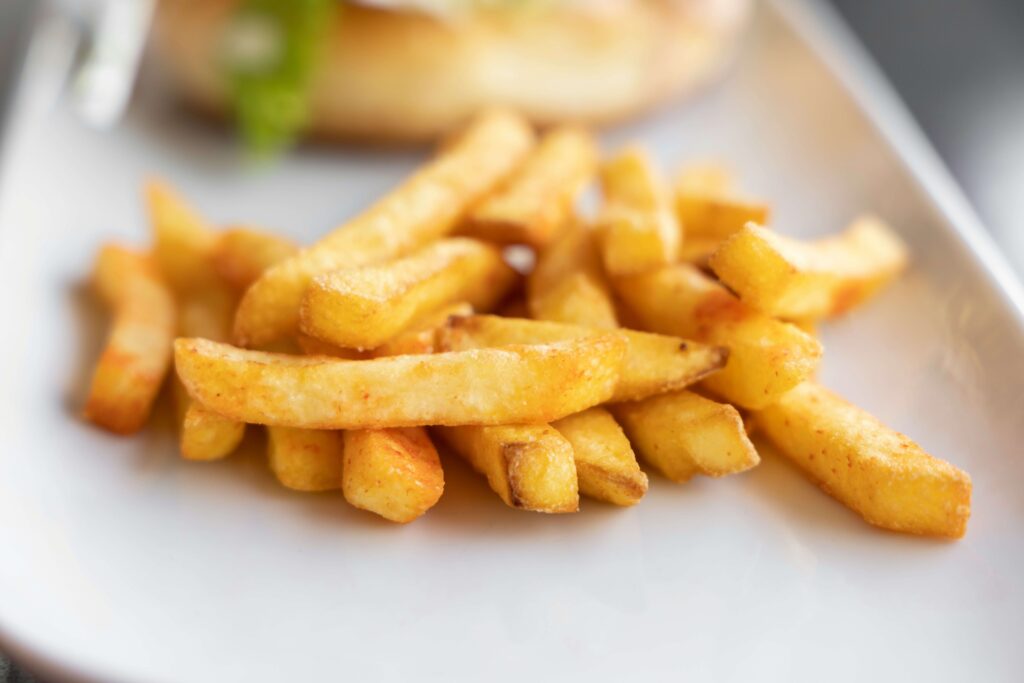
Deep-fried foods are cooked by submerging them in hot oil, resulting in a crispy texture. Common examples include fried chicken, french fries, and battered fish.
Why Deep Fried Foods May Accelerate Aging
- Trans Fats: Deep frying can create trans fats, which are associated with inflammation, oxidative stress, and an increased risk of age-related diseases[3].
- Advanced Glycation End-Products (AGEs): The high heat in deep frying can lead to the formation of AGEs, which may contribute to accelerated aging by impacting skin elasticity and promoting inflammation.
- Caloric Density: Deep-fried foods are often high in calories and can contribute to weight gain and obesity, factors linked to premature aging.
- Inflammation: The process of deep frying produces compounds that can trigger inflammation in the body, contributing to various aging-related issues.
- Free Radicals: The high temperatures used in deep frying can generate free radicals, unstable molecules that can damage cells and contribute to aging.
Healthy Alternatives
- Baked or Grilled Options: Choose baking, grilling, or roasting as cooking methods instead of deep frying to reduce the formation of harmful compounds.
- Air Frying: Consider using an air fryer, which uses hot air circulation to achieve a crispy texture with significantly less oil compared to deep frying.
- Steam or Boil: Steam or boil vegetables, meat, or fish to retain nutrients and reduce the risk of harmful compounds associated with frying.
- Use Healthier Oils: If frying is necessary, use oils with high smoke points and healthier fat profiles, such as olive oil or avocado oil.
- Herbs and Spices: Enhance flavor without deep frying by using herbs, spices, and marinades to add zest to your meals. Herbs enhance skin health with nutrients, antioxidants, and anti-inflammatory properties for improved complexion and reduced inflammation.
4. Excessive Alcohol
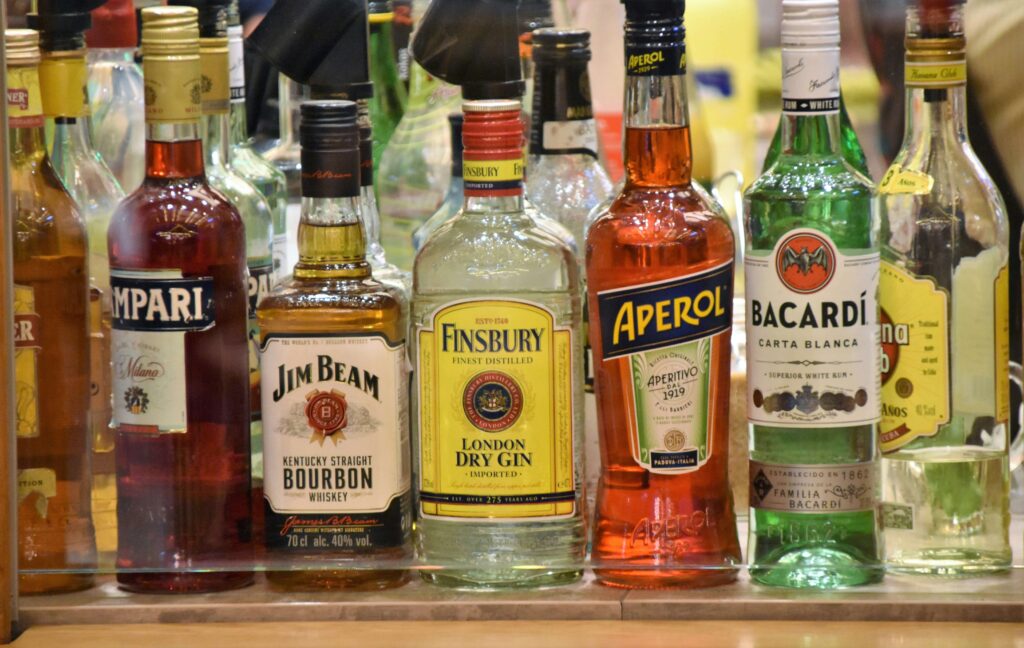
Excessive alcohol consumption refers to the intake of alcoholic beverages beyond moderate and responsible limits. It can include binge drinking or chronic heavy drinking over an extended period.
Why Excessive Alcohol May Accelerate Aging
- Dehydration: Alcohol is a diuretic, leading to dehydration, which can affect skin health, making it appear dry and aged[4].
- Liver Damage: Chronic alcohol consumption can damage the liver, affecting its ability to function properly. The liver plays a crucial role in detoxification and overall health.
- Inflammation: Excessive alcohol intake can contribute to chronic inflammation, a factor linked to various age-related diseases and accelerated aging.
- Oxidative Stress: Alcohol metabolism generates free radicals, causing oxidative stress that can damage cells and tissues, contributing to premature aging.
- Nutrient Depletion: Alcohol interferes with the absorption and utilization of essential nutrients, potentially leading to deficiencies that affect overall health.
Healthy Alternatives
- Moderate Consumption: If you choose to drink, do so in moderation. Moderate alcohol consumption is generally considered one drink per day for women and up to two drinks per day for men.
- Hydrate: Alternate alcoholic beverages with water to stay hydrated and minimize the dehydrating effects of alcohol.
- Choose Red Wine: Red wine contains antioxidants like resveratrol, which may have some health benefits. However, moderation is key.
- Mocktails: Enjoy alcohol-free alternatives or mocktails made with fresh juices, herbs, and sparkling water for a flavorful and refreshing option.
- Mindful Drinking: Be mindful of your alcohol intake, consider the alcohol content of beverages, and pay attention to how your body reacts to alcohol.
5. Red and Processed Meats

Red meat, encompassing varieties such as beef, lamb, and pork, is renowned for its high protein content and richness in essential nutrients like iron.
However, processed meats undergo additional treatments such as curing, smoking, or the inclusion of preservatives. Examples of processed meats include bacon, sausages, and deli meats.
Why Red and Processed Meats May Accelerate Aging
- Saturated Fats: Red and processed meats often contain high levels of saturated fats, linked to inflammation and cardiovascular issues[5].
- Advanced Glycation End-Products (AGEs): Cooking methods for red and processed meats, especially at high temperatures, can produce AGEs, contributing to aging and chronic diseases.
- Heme Iron: Red meat contains heme iron, which, in excess, may promote oxidative stress and contribute to cellular damage.
- Nitrates and Nitrites: Found in processed meats, these compounds can form nitrosamines, associated with an increased risk of certain cancers and potentially accelerating aging.
- Preservatives and Additives: Processed meats may contain additives and preservatives, which, when consumed in excess, can have negative health effects.
Healthy Alternatives
- Lean Proteins: Opt for lean protein sources like poultry, fish, tofu, legumes, and plant-based protein alternatives that maintain muscles, support the immune system, aid in weight management, and boost energy levels.
- Fish: Fatty fish like salmon provide omega-3 fatty acids, which have anti-inflammatory properties and are beneficial for overall health.
- Plant-Based Proteins: Incorporate beans, lentils, chickpeas, and plant-based protein sources into your diet.
- Poultry: Choose skinless poultry like chicken or turkey, which generally has lower saturated fat content compared to red meats.
- Processed Meat Alternatives: Explore plant-based alternatives for sausages, burgers, and deli slices made from ingredients like soy, mushrooms, or legumes.
6. High Salted Foods

High salted foods include items with excessive salt content, such as salty snacks, processed meats, and canned soups.
Why High Salted Foods May Accelerate Aging
- Increased Blood Pressure: Excessive salt intake is linked to elevated blood pressure, which can contribute to cardiovascular issues associated with premature aging[6].
- Dehydration: High salt levels can lead to water retention and dehydration, affecting skin health and potentially accelerating the aging process.
- Organ Strain: The kidneys, in particular, may experience strain due to prolonged high salt intake, potentially impacting overall health and aging.
Healthy Alternatives
- Fresh Fruits and Vegetables: Opt for fresh produce like apricots to increase potassium intake and balance sodium levels.
- Herbs and Spices: Enhance flavor with herbs and spices instead of salt to reduce overall sodium intake.
- Whole Grains: Choose whole grains over processed foods, as they generally contain less salt and offer additional health benefits.
- Lean Proteins: Select lean proteins like fish, poultry, and plant-based alternatives that are naturally lower in sodium.
- Read Labels: Check food labels for sodium content and choose low-sodium or salt-free options when available.
7. Highly Caffeinated Drinks

Why Highly Caffeinated Drinks May Accelerate Aging
- Dehydration: Caffeine is a diuretic, leading to increased fluid loss and potential dehydration, which can impact skin health and contribute to premature aging[6].
- Disrupted Sleep: Excessive caffeine intake, especially close to bedtime, can disrupt sleep patterns, hindering the body’s natural rejuvenation process and potentially accelerating aging.
- Stress on the Heart: High caffeine levels may lead to increased heart rate and blood pressure, putting additional stress on the cardiovascular system, which can contribute to aging-related issues.
Healthy Alternatives
- Water: Opt for plain water as your primary beverage to stay hydrated without the potential negative effects of caffeine.
- Herbal Teas: Choose caffeine-free herbal teas for a soothing and hydrating alternative.
- Decaffeinated Coffee: If you enjoy coffee, opt for decaffeinated versions to reduce caffeine intake while still enjoying the flavor.
- Green Tea: A moderate amount of green tea provides antioxidants and a mild caffeine boost compared to highly caffeinated drinks.
- Natural Fruit Juices: Freshly squeezed fruit juices like grapefruit juice without added sugars can provide a refreshing and healthier option than highly caffeinated drinks.
8. Sugary Foods

Sugary foods, including candies, pastries, and sweetened snacks, are high in added sugars, impacting overall health and potentially accelerating the aging process.
Why Sugary Foods May Accelerate Aging
- Glycation: Excessive sugar consumption can lead to glycation, a process where sugar molecules attach to proteins, forming advanced glycation end-products (AGEs). AGEs contribute to skin aging by reducing collagen flexibility and promoting wrinkles[8].
- Inflammation: High sugar intake triggers inflammation in the body, which is associated with various age-related conditions, including skin issues.
- Collagen Breakdown: Sugar interferes with collagen production, the protein responsible for skin elasticity. Reduced collagen can lead to sagging and the formation of fine lines.
Healthy Alternatives
- Fresh Fruits: Satisfy sweet cravings with whole fruits, providing natural sugars, fiber, and antioxidants for skin health.
- Dark Chocolate: Choose dark chocolate with higher cocoa content, which contains antioxidants beneficial for skin and overall well-being.
- Dried Fruits: Opt for unsweetened dried fruits for a sweet snack without added sugars, enjoying the natural sweetness and nutrients.
9. Refined Carbohydrates
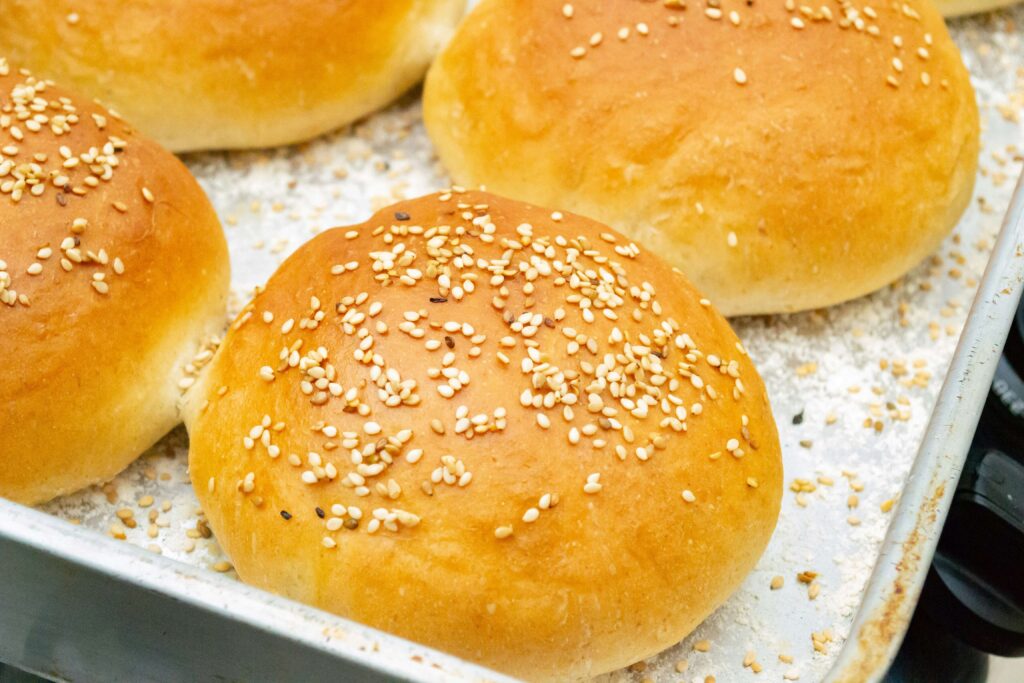
Refined carbohydrates are processed foods that have undergone extensive milling and stripping of their natural fiber and nutrients. Common examples include white bread, sugary cereals, and pastries.
Why Refined Carbohydrates May Accelerate Aging
- Rapid Blood Sugar Spikes: Refined carbohydrates are quickly converted into sugar in the body, leading to rapid spikes in blood sugar levels. This process, if frequent, may contribute to inflammation and oxidative stress, accelerating the aging process[9].
- Insulin Resistance: Regular consumption of refined carbohydrates can contribute to insulin resistance, a condition where cells become less responsive to insulin, increasing the risk of chronic diseases associated with aging.
- Inflammation: Refined carbohydrates may trigger inflammation in the body, a factor linked to various age-related diseases and overall accelerated aging.
Healthy Alternatives
- Whole Grains: Choose whole grains like brown rice, quinoa, oats, and whole wheat bread, which retain their natural fiber and nutrients, providing a slower release of energy.
- Vegetables: Opt for a variety of colorful vegetables to increase fiber intake and receive essential vitamins and minerals.
- Legumes: Incorporate beans, lentils, and chickpeas into your diet for a good source of fiber, protein, and nutrients.
- Fruits: Enjoy whole fruits instead of fruit juices or processed fruit snacks to benefit from fiber and natural sugars in a balanced form.
- Nuts and Seeds: Snack on nuts and seeds like almonds for a satisfying crunch while gaining healthy fats, fiber, and essential nutrients.
10. Commercial Salad Dressings
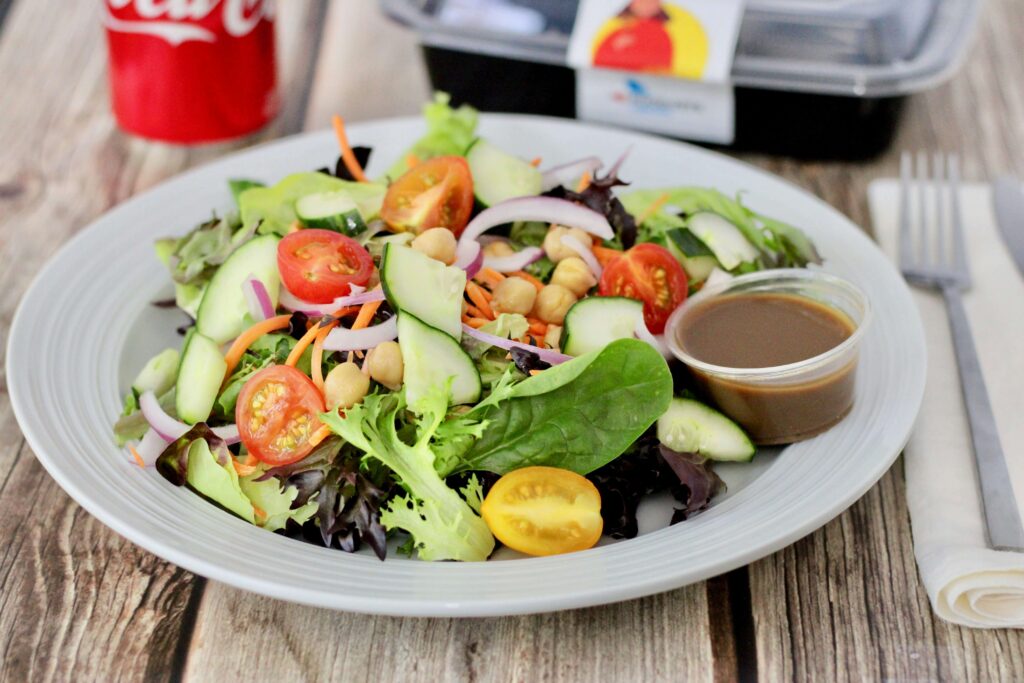
Commercial salad dressings, available in bottles at grocery stores or restaurants, often contain added sugars, unhealthy fats, and preservatives.
Popular varieties include creamy dressings, vinaigrettes, and pre-made mixes.
Why Commercial Salad Dressings May Accelerate Aging
- Added Sugars: Many commercial dressings have high levels of added sugars, which can contribute to inflammation, glycation, and accelerate the aging process[10].
- Unhealthy Fats: Some dressings use unhealthy fats that may contribute to oxidative stress and have negative effects on skin health.
- Preservatives: The preservatives in these dressings may have potential health impacts when consumed regularly, potentially affecting overall well-being and aging.
Healthy Alternatives
- Homemade Dressings: Create your own dressings using olive oil, balsamic vinegar, lemon juice, and herbs for a healthier option with better control over ingredients.
- Olive Oil and Vinegar: A simple mix of olive oil and vinegar or lemon juice can be a light and nutritious alternative to many commercial dressings.
- Greek Yogurt Dressings: Substitute creamy dressings with those made from Greek yogurt, offering a creamy texture with added protein and probiotics.
- Herbs and Spices: Enhance flavor with fresh herbs, garlic, or spices instead of relying on store-bought dressings for added taste.
Conclusion
What we eat plays a big role in how our skin ages. While enjoying treats is okay, too much of certain foods can speed up aging. The key is moderation and picking healthier options.
You don’t have to give up everything, just be mindful. Choose whole foods, cook at home, and snack on fruits and veggies.
Eating in a balanced way keeps your skin happier and helps you age gracefully. It’s about making smart choices without missing out on the things you love.
So, let’s eat smart, stay happy, and keep that skin glowing!







